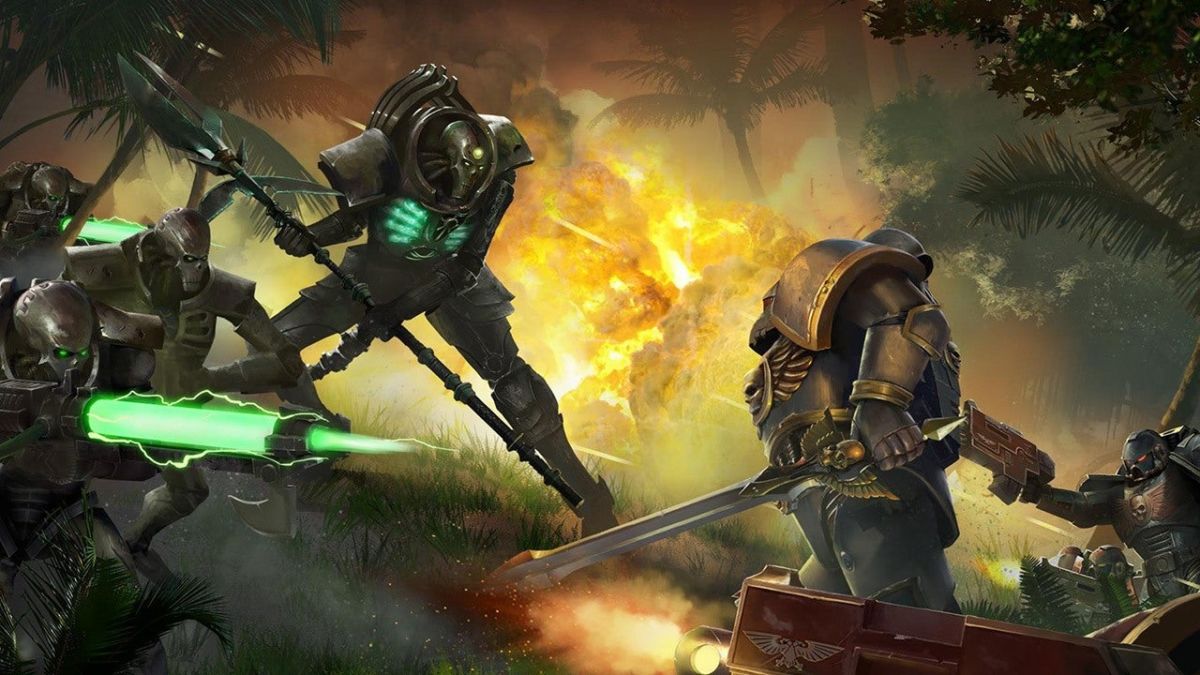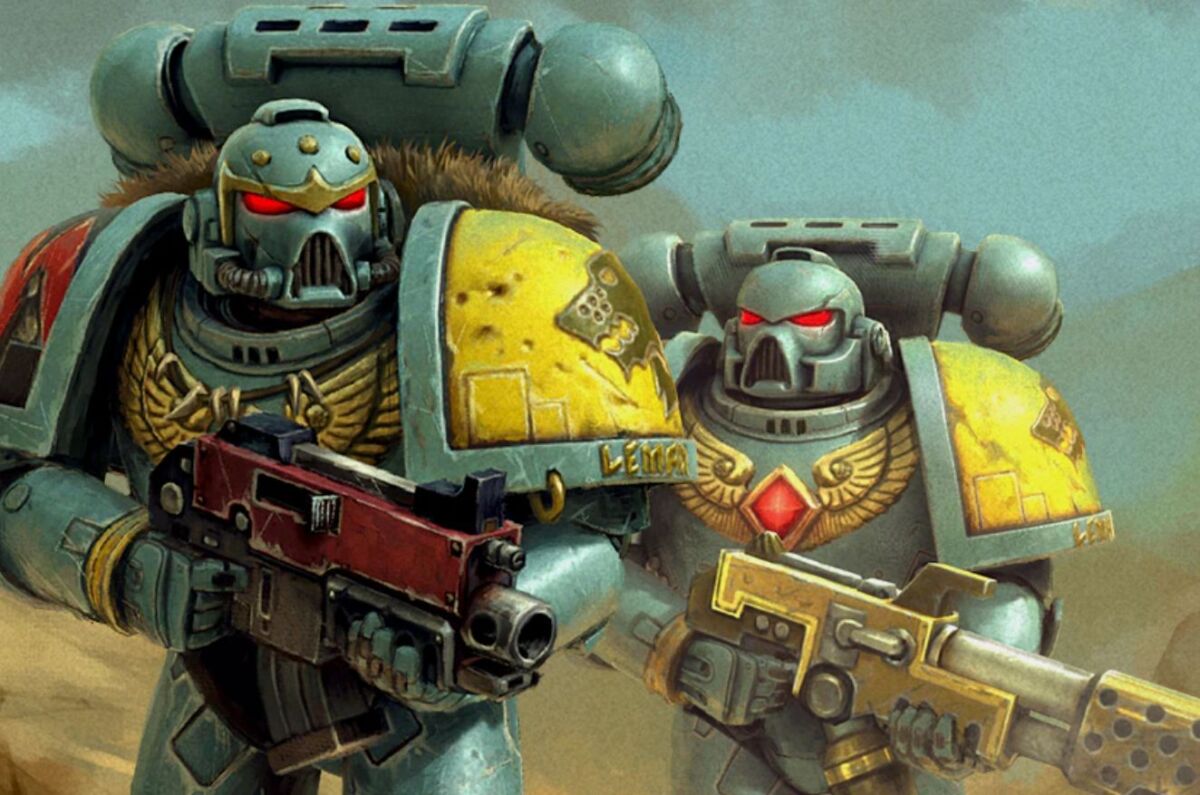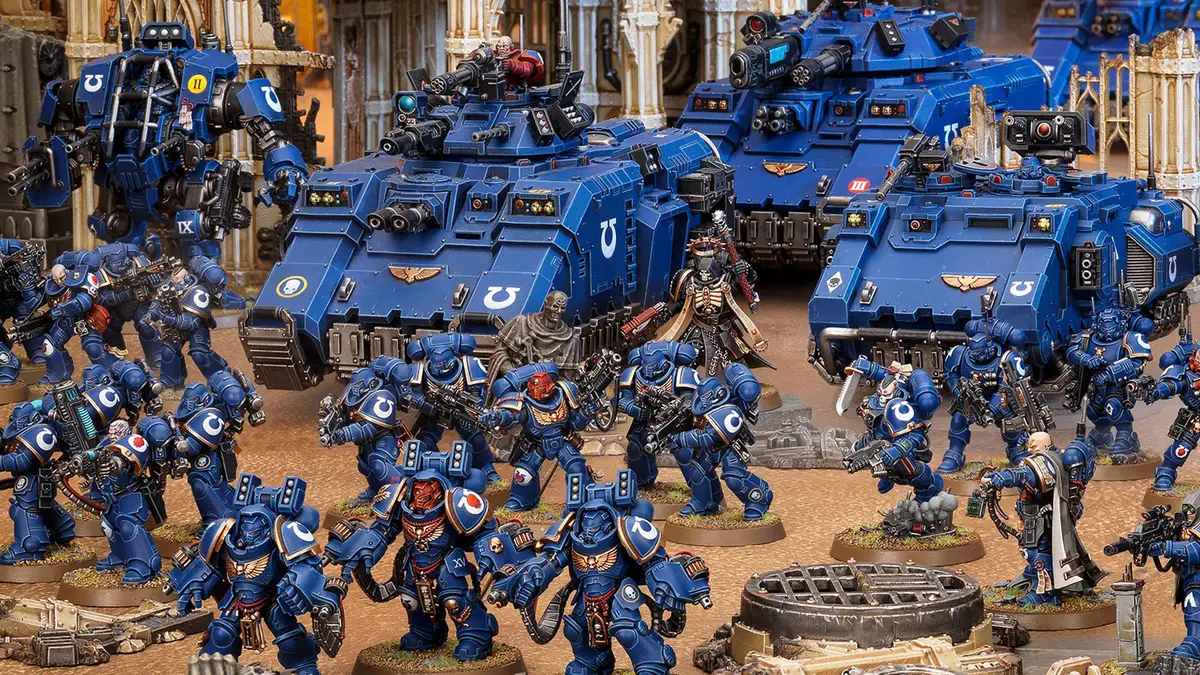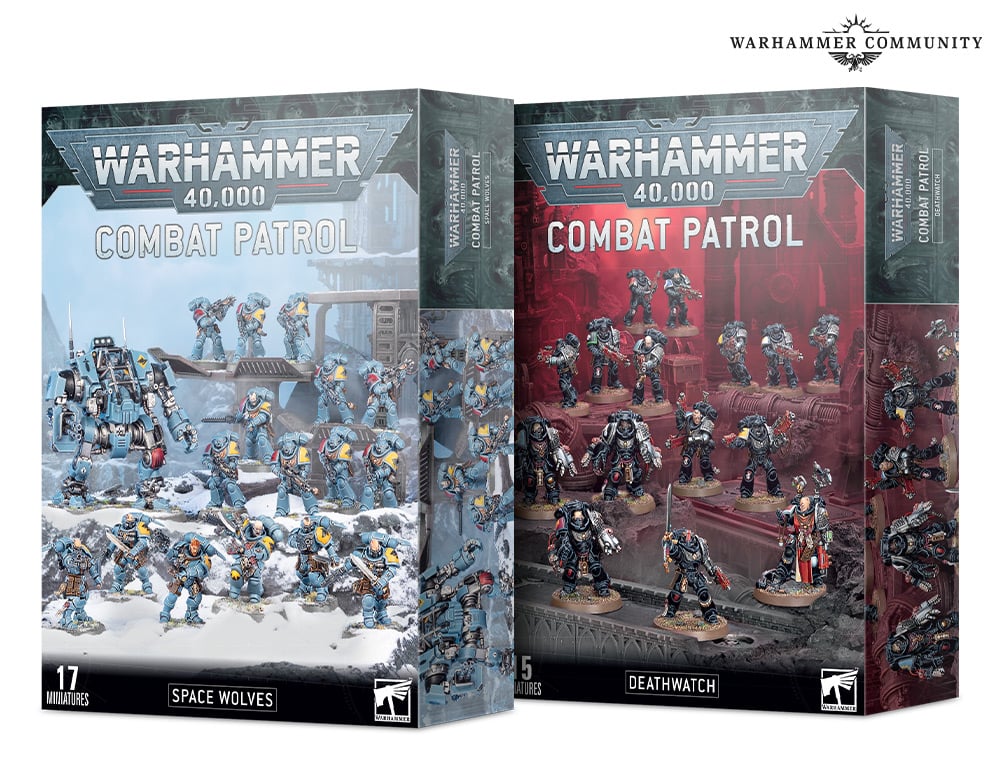Sometime around the mid-2010s, board game nights skyrocketed in value as a social activity. All of a sudden, I found myself getting invited to board-game nights, and saw bars and cafes specifically geared towards this springing up in cities around the UK. The market hadn’t evolved in any major way (although it has now), it was just another brick being removed from the wall that designated ‘playing’ to be the domain of children. Nowadays, adults unironically play board games, collect Lego, go to trampoline parks and indulge in tabletop gaming.
You could argue that the tabletop RPG set the standard for this, even before video games. It resided in a strange limbo between having ostensibly ‘kid-friendly’ themes and imagery but requiring a level of organisation and calculation far beyond the reach of most kids’ attention spans. Nowhere was that truer than with Warhammer.
Invented by Rick Priestly, Bryan Ansell and Richard Halliwell of Games Workshop in 1982, Warhammer started out as an out-of-the-box fantasy RPG focused on combat. Unlike Dungeons & Dragons, building and painting miniatures was absolutely pivotal to the game – models came in metal sprues in the box and you had to put them together yourself, rather than subbing them out for cardboard tokens or simply relying purely on imagination. It caught on almost immediately, and one year later Warhammer 40,000 was born: a bizarre, somewhat gonzo science fiction counterpart to the fantasy iteration.

Fast-forward 40 years and you would be hard-pressed to find anyone who hasn’t at least heard the word ‘Warhammer’ before. 40k, as it’s colloquially known, absolutely dominates the tabletop market, fuelling massive conventions, a flourishing competitive scene, an army of independent content creators and now even a TV show in the works helmed by nerd culture evangelist (and occasional actor) Henry Cavill. To the people who play it, it’s a gateway to a beautiful, inclusive, diverse community and lore so complex and bloated that you could get a PhD in it.
If someone has indeed heard of 40k, chances are the extent of their knowledge boils down to a few things:
- It’s heinously complicated
- It’s very expensive
- The lore/artwork is dark and depressing
- It’s very time-consuming
As a long-time fan currently experiencing the pinnacle of his enthusiasm, I’m here to tell you that all of those things are absolutely true.
Warhammer is a mathematics-laden dice game, and depending on how well you remember all the rules, a single game can clock in at 5+ hours. Building a decent army does indeed have the potential to rack up a scary bill. The aesthetic is phenomenally (often laughably) bleak and it will indeed greedily lap up all your free time should you succumb to its siren song.

So, why the boom? There are a few factors.
One is that it’s much easier to seek out guidance on how to collect and play than it used to be. YouTube is awash with tutorials on painting techniques, modelling tips and how-to-play guides, there are myriad forums to seek out direct advice and yet more dedicated websites with lots of useful tips. All of these go a long way to reduce the once-leaden barrier to entry. In addition, there are numerous channels running battle report videos that serve as perhaps the best endorsement the game has ever had (more on that in a bit).
The overall quality of the materials also factors in. Most models are now cast in plastic, utilising a ‘push-fit’ design which makes the construction process much more intuitive, certainly more so than the horrifying metal kits that were around when I was a kid. Likewise, the paints have vastly improved – longer shelf-life, a wider range of colours and ingenious innovations like ‘contrast paint’ which enables you to colour and shade a model all at the same time. The models themselves have also vastly improved — they’ve always been interesting but some of the sculpts released in recent years are bonafide works of work, especially in the hands of a gifted artist.
Finally, the community has in recent years diversified and blossomed. Your stereotypical Warhammer fan – a standoffish cave dweller with no patience for anyone with a level of expertise less than themselves – doesn’t really exist. In my time playing I’ve found the tabletop community to be one of the most diverse, accepting and friendly groups of people I’ve ever encountered, on a par with metalheads. Games Workshop deserves some credit here for really putting the time in to foster that community, the one concession being that it still didn’t feel overly inviting to anyone new. At least until now.

This brings me to my main point: if you haven’t tried Warhammer, now is absolutely the best time. The 10th edition of Warhammer 40,000 was recently released and an astonishing amount of effort has been invested into opening it up to newcomers.
Firstly, the rules. Whilst still anything but simple, care has been taken to make them easier to follow and, crucially, easier to access. In previous editions, you had to buy a rulebook thick enough to kill a man to get to grips with the core ruleset, and then you had to buy a separate book or ‘Codex’ for the army you were running. As if that wasn’t enough, every 6 months or so the rules would be updated and supplemental material would come out. In times past I would buy a Codex, and start building my army only to find that by the time I was done, I had to get a whole new book just to align with the meta.
Now though, all of the core rules and data sheets for every army and model are online, for free. To cap it off, a reference and army-building app has been released which keeps everything in one convenient place. I cannot tell you how much of a breath of fresh air this is. Games Workshop have also promised that any updates will be reflected in the digital content from the moment they come through.
So, that’s the complexity addressed, now what about the expense? I won’t lie, it’s still a costly hobby, but GW has made it easier to get into it without so much financial risk.

Combat Patrol boxes have been launched for every army. They come with all the models and rules you need to run a small force. They’ll still cost you a bit but compared to buying everything individually it’s a vast improvement. In recent years they’ve also taken to releasing boxes with two army kits, some rules and a board all in one bundle, the latest of these being the Leviathan box, which houses a decent-sized force of the poster-boy Space Marines and the poster-bug Tyranids, so you can go in with a friend and make a start together.
Of course, everything I’ve referenced above is completely irrelevant if you don’t actually enjoy playing the game. This has been an issue that’s plagued Warhammer and other tabletop strategy games going all the way back to Risk – they just don’t seem like a good time on paper. My counterpoint to that would be, you just have to put a little bit of effort in to let them.
Much like Dungeons and Dragons, your imagination is crucial to making Warhammer work in the way that it’s supposed to. Granted, you are directly competing against the person on the other side of the table, so things will always feel competitive, but Warhammer is a game of dice rolling, and no matter how gifted you are at strategizing and list-building, a few bad dice rolls can change everything. I have never met a Warhammer player who hasn’t experienced this at least once, and when it happens at a crucial moment, it is indeed a bummer.
The point, though, is not to win or lose (unless you’re playing competitively), the point is to bring the table to life, to understand that each dice roll and each action is a small part of a story you and your opponent are telling. That is the little spark you have to place into your game to really make it work. Once you recognise that all the little moments along the way are telling a story, then things start to make a lot more sense.

In one game against my brother, he rammed his Ork Trukk into a squad of my Rubric Marines, killing all but one of them in the ensuing carnage. When I hit back, I was miraculously able to destroy the Trukk, but in 40k when a vehicle is destroyed you roll a dice, and on a 6 it explodes, damaging everything around it. In this case, that’s exactly what happened, and the resulting explosion killed my squad leader. So we were left with a mental image of an armoured mage-warrior stopping a scrap metal wagon in its tracks, smacking it with a magic staff and then perishing in the subsequent kaboom. If we hadn’t taken the time to acknowledge how ridiculous that was, the moment might have just passed by as a random string of numbers and stats.
That, I think, speaks to the allure of Warhammer, and something which is coming to light more and more: it’s really, really silly. At any given moment you might be fighting piles of dust fused into antiquated suits of armour, green mushroom men whose vehicles only work because they believe they do, warrior nuns who drop battle cathedrals into the field from orbit, rotting daemons who lollop across the battlefield cackling and being sick on people or space dwarves who determine their targets by passing moral judgement. Warhammer is cartoonishly absurd, and accepting that is the first step to being sucked in.
In fact, the largest issue it faces is that some people take it too seriously, whether it be from the wild factionalism of the hardcore scene or the unfortunate minority of extreme right-wing fans who erroneously herald it as a bastion of their beliefs (if you want to know more about that, Robert Evans of Behind the Bastards fame wrote an excellent piece on his Substack about it). The lore and background of the franchise are fascinating and contain some wonderful stories, most prominently in the Horus Heresy series which underpins the entire framework of the game, but the crux of Warhammer isn’t some kind of gritty allegory or political statement – it is an imagined fantasy world where there are no good guys, just a cavalcade of variously vicious armies all murdering each other.
If you are considering diving in, my advice would be to check out some of those aforementioned YouTube channels. Some of them have become very well-established and put out beautiful videos which really extol the fun of the hobby. Play on Tabletop has artfully developed a format which condenses a single game down to a 40-minute cut, presented almost like a sports broadcast. Tabletop Tactics meanwhile (my personal favourite) make somewhat longer videos, but really pride themselves on being the most entertaining hosts they possibly can and committing 110% to the bit, often with hilarious results. Those are just two examples but you’ll find there are dozens of content creators online with something to offer everyone.
If that sets anything off for you, you don’t even need to buy a box to play. Official Warhammer shops and independent clubs alike offer taster experiences where you can just borrow some models and get shown how to play, so you know exactly what you’re committing to before putting any money on the table. Likewise, you can also try out the painting first to see if it’s something you’re willing to commit to. I know plenty of people who have fully (and beautifully) painted armies but have never actually had a game. There are literally no wrong answers. You can even pick up third-party models from other miniature builders if you want to save costs or the Games Workshop range doesn’t do it for you. A cottage industry of 3D-printed minis has sprung up over the past few years and the output is often cheaper than name-brand fare.
Rolling dice to simulate a battle between two sets of plastic toys may seem childish (and it absolutely is), but we’ve all become a bit more childish in recent years and the stigma around that has all but subsided. So, if you were ever even the least bit curious about the grimdark future, now might be the perfect opportunity to come visit. We’d be happy to have you.
READ NEXT: The Cultural Significance of Warhammer 40k
Some of the coverage you find on Cultured Vultures contains affiliate links, which provide us with small commissions based on purchases made from visiting our site.

